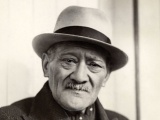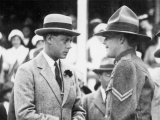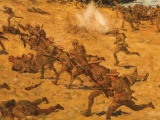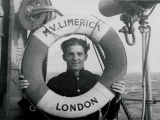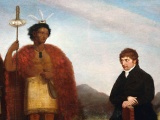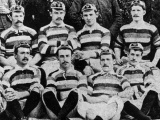Historic NZ events in May
May
1893 'King Dick' Seddon becomes premier
Richard John Seddon became premier following the death of John Ballance. Immortalised as ‘King Dick’, Seddon was to dominate the New Zealand political landscape for the next 13 years. He remains this country’s longest-serving premier or prime minister.
Read more...1955 RNZAF's first combat strike since Second World War
Five Vampire fighter aircraft of No. 14 Squadron carried out the RNZAF’s first combat strike since the Second World War against guerrillas in the Malayan jungle.
Read more...May
1868 First shipment of salmon and trout ova arrives
The clipper Celestial Queen arrived at Port Chalmers carrying the first shipment of live fish ova from England. These fish were intended to provide sport for the settlers, but none survived in New Zealand.
Read more...1964 New Zealand's last electric tram trip
Tram no. 252, displaying the message ‘end of the line’ and driven by Wellington Mayor Frank Kitts, travelled from Thorndon to Newtown zoo. Large crowds lined the streets to witness the end of electric trams in New Zealand.
Read more...May
1820 First European plough used in New Zealand
The missionary John Butler turned New Zealand's first furrow at Kerikeri, writing: ‘I trust that this day will be remembered with gratitude, and its anniversary kept by ages yet unborn.’
Read more...1897 New Zealand's first woman doctor registered
Margaret Cruickshank, the first female doctor registered in New Zealand, practised in Waimate, South Canterbury, until her death from influenza in 1918.
Read more...1929 Controversial ex-mayor killed in Berlin riots
Charles Ewing Mackay, the disgraced former mayor of Whanganui, was shot dead by Berlin police during May Day riots in the German capital.
Read more...May
1772 Marion du Fresne arrives in the Bay of Islands
Marion du Fresne’s was the second French expedition to visit New Zealand, following that of Jean François Marie de Surville in 1769. Du Fresne’s acceptance of the philosopher Jean-Jacques Rousseau’s beliefs about ‘noble savages’ was to have unfortunate consequences for him and his crew.
Read more...1937 Avalanche kills two workers at the Homer tunnel
The engineer-in-charge and the overseer were killed when the second avalanche to hit the Homer tunnel project in less than 12 months struck without warning.
Read more...May
1833 James Busby arrives in the Bay of Islands
James Busby’s arrival in the Bay of Islands was the first tentative step along a path that led to the signing of the Treaty of Waitangi seven years later.
Read more...1898 Dog Tax War narrowly averted
War threatened sleepy Hokianga as government troops marched towards armed Māori ‘rebels’.
Read more...May
1869 Colonial troops invade the Urewera
The main purpose of the operation was to punish Tūhoe for supporting Te Kooti Rikirangi, whose ‘rebel’ force they had sheltered after it was defeated at Ngātapa, inland from Poverty Bay, in January.
Read more...May
1846 Devastating landslide at Lake Taupō
A devastating landslide obliterated the Ngāti Tūwharetoa village of Te Rapa on the south-west shore of Lake Taupō.
Read more...1856 Henry Sewell becomes the country’s first premier
Sewell held the position for just 14 days before being replaced by his provincialist rival William Fox, whose ministry lasted just over a week.
Read more...1888 Anti-Chinese hysteria in Dunedin
A meeting in Dunedin presided over by the mayor unanimously called for a ban on further Chinese immigrants.
Read more...May
1926 New Zealand Railways Magazine launched
Originally intended as a journal for the Railways Department’s 18,000 staff and their major customers, the New Zealand Railways Magazine evolved into a hugely popular general-interest periodical.
Read more...1970 'Cheryl Moana Marie' hits no. 1
Pop singer John Rowles established himself as an international star in the late 1960s. His hit single ‘Cheryl Moana Marie’ sold a million copies worldwide.
Read more...May
1907 First School Journal published
New Zealand pupils were for the first time able to read a schoolbook published in their own country.
Read more...1915 Kiwi Wimbledon winner killed in battle
New Zealand's most successful tennis player, Anthony Wilding was one of the stars of the sport in the decade before the First World War.
Read more...1945 New Zealand celebrates Victory in Europe
Germany surrendered on 7 May, New Zealand time, but acting Prime Minister Walter Nash insisted that celebrations wait until after British Prime Minister Winston Churchill officially announced peace at 1 a.m. on 9 May, New Zealand time.
Read more...May
1897 NZ's first woman barrister and solicitor appointed
Following the passage of the Female Law Practitioners Act 1896, Ethel Benjamin became the first woman to be admitted as a barrister and solicitor of the Supreme Court of New Zealand.
Read more...1925 Death of William Massey
A gruff Ulsterman from South Auckland, William Ferguson Massey (‘Farmer Bill’) is New Zealand’s second-longest-serving prime minister.
Read more...1960 All-white All Blacks leave for South Africa
Despite protests, the controversial rugby tour went ahead. The issue of sporting ties with South Africa would eventually split the country in 1981.
Read more...May
1945 Charles Upham presented with first Victoria Cross
New Zealand’s most-decorated soldier, Charles Upham, received the first of his two VCs – for outstanding gallantry and leadership during the Battle of Crete in 1941 – from King George VI at Buckingham Palace.
Read more...May
1971 Anti-Vietnam War protests in Auckland
Anti-war protesters disrupted a civic reception in Auckland for New Zealand soldiers returning from the Vietnam War.
Read more...May
1936 National Party founded
Following their crushing defeat by the Labour Party in the 1935 general election, the remnants of the United–Reform coalition government met in Wellington to establish a new ‘anti-socialist’ party.
Read more...1947 Death of Frances Hodgkins
One of this country's most celebrated artists, Frances Hodgkins spent most of her life overseas. She earned a place among the British avant-garde of the 1930s and 1940s – the first New Zealand-born artist to achieve such stature.
Read more...1995 New Zealand wins the America’s Cup
Few New Zealanders in 1995 could have avoided television commentator Peter Montgomery’s famous line, ‘the America’s Cup is now New Zealand’s cup!’
Read more...May
1866 Wreck of the General Grant
Sailing from Melbourne to London, the General Grant hit cliffs on the west coast of the main island in the subantarctic Auckland Islands. Fifteen of the 83 people on board survived the sinking, but only 10 of them were ultimately rescued 18 months later.
Read more...1870 First game of rugby played in NZ?
Around 200 people were on hand at Nelson’s Botanic Reserve to watch a game of football played under Rugby rules.
Read more...1907 Plunket Society formed
Dr Frederic Truby King helped form the Society for the Promotion of the Health of Women and Children at a meeting in Dunedin Town Hall.
Read more...1941 New Zealand minesweeper sunk near Hauraki Gulf
The minesweeper HMS Puriri was the second victim of mines laid off the Northland coast by the German raider Orion. Five of its crew were killed.
Read more...May
1901 Early motoring offence
Nicholas Oates appeared in the Christchurch Magistrate's Court charged with driving ‘a motor car within the city at a speed greater than four miles an hour’ on Lincoln Road, Christchurch.
Read more...1920 Whanganui mayor shoots poet
The victim of the shooting, poet Walter D’Arcy Cresswell, alleged that Mayor Charles Mackay had made homosexual advances towards him in the mayoral office and panicked when faced with the prospect of public exposure.
Read more...May
1846 Eight killed in attack on Boulcott Farm
Disagreements over the validity of land purchases by the New Zealand Company led to a series of skirmishes between Māori and government troops in the Wellington region in 1846.
Read more...1981 All Whites beat Australia on road to Spain
The New Zealand football team's famous 2-0 victory in Sydney was a defining moment in their epic qualifying campaign for the 1982 World Cup finals.
Read more...May
1833 First British Resident comes ashore
Hundreds of Māori greeted the new British Resident in New Zealand, James Busby, when he landed at the Paihia mission station on 17 May 1833. The ceremony that followed was the first formal meeting between Māori chiefs and the representative of a great power.
Read more...1922 Catholic Bishop found not guilty of sedition
James Liston, the assistant bishop of Auckland, was found not guilty of sedition following a high-profile court case.
Read more...1962 George Wilder escapes from prison
George Wilder was a burglar who left apology and thank-you notes for his victims. He was at large for 65 days, becoming a folk hero in the process.
Read more...May
1893 Meri Te Tai Mangakāhia addresses Kotahitanga Māori parliament
Meri Te Tai Mangakāhia, a prominent advocate for Māori women, addressed the Kotahitanga Māori parliament - the first woman known to have done so.
Read more...1937 New Zealand nurses detained on way to Spanish Civil War
The only organised New Zealand contingent to serve in the Spanish Civil War comprised New Zealand Spanish Medical Aid Committee (SMAC) nurses René Shadbolt, Isobel Dodds and Millicent Sharples.
Read more...1966 Death of Māori King Korokī
Korokī Te Rata Mahuta Tāwhiao Pōtatau Te Wherowhero was the fifth head of the Kīngitanga movement founded in 1858 in response to European colonisation.
Read more...May
1846 Brunner, Kehu and Heaphy reach Māwhera pā
This journey was part of Thomas Brunner's epic 1846-48 exploration of the South Island. He was guided by Kehu of Ngāti Tūmatakōkiri and accompanied by Charles Heaphy, a draftsman and artist with the New Zealand Company.
Read more...1987 Attempted hijacking in Fiji foiled
An attempted hijacking of an Air New Zealand Boeing 747 at Nadi airport, Fiji, was thwarted when a member of the cabin crew struck the hijacker on the head with a whisky bottle.
Read more...May
1773 New Zealand's first sheep released
During his second voisit to New Zealand in 1773, James Cook released a ewe and a ram in Queen Charlotte Sound. They survived only a few days – an inauspicious start to this country’s long association with sheep.
Read more...1865 Loss of City of Dunedin with all hands
The paddle steamer City of Dunedin left Wellington at around 5 p.m. on Saturday 20 May. It was never heard from again and no trace was ever found of the four dozen people on board.
Read more...1870 Pasifika labourers arrive in Auckland
New Zealand received its first known shipload of labourers from the Pacific Islands when the clipper schooner Lulu docked in Waitematā Harbour
Read more...1941 German paratroops land on Crete
The Battle for Crete raged for 12 days before the Allies were driven off the island. Casualties were high on both sides. More than 650 New Zealanders were killed and 2000 taken prisoner.
Read more...May
1840 Hobson proclaims British sovereignty over New Zealand
Lieutenant-Governor William Hobson proclaimed British sovereignty over all of New Zealand – the North Island on the basis of cession through the Treaty of Waitangi, and South and Stewart Islands by right of discovery.
Read more...May
1884 First New Zealand rugby team in action
The first representative New Zealand rugby team played its first match, defeating a Wellington XV 9-0 before embarking on a tour of New South Wales.
Read more...1995 Waikato-Tainui sign Deed of Settlement with the Crown
Waikato–Tainui was the first iwi to reach a Treaty of Waitangi settlement with the Crown for injustices that went back to the 1860s. The Deed of Settlement included cash and land valued at a total of $170 million.
Read more...May
1861 First major gold rush in Otago
Gabriel Read gained fame and fortune when he found gold near the Tuapeka River, a tributary of the Clutha River in Otago.
Read more...1966 Coronation of first Māori Queen
Princess Piki, the daughter of King Koroki, was selected as the sixth Maori monarch − and first Queen − during her father's tangi, in accordance with Kingitanga protocol. She assumed her mother’s name, Te Atairangikaahu.
Read more...May
1854 Parliament's first sitting in Auckland
It started with a bang – 21 in fact, fired from the guns at Auckland’s Fort Britomart. Once the smoke cleared, New Zealand’s first Parliament was in business. Read more...
1943 Turning point in Battle of the Atlantic
In the Battle of the Atlantic, one of the most important campaigns of the Second World War, 24 May 1943 was a crucial date. Thousands of New Zealanders took part in this long and bitter struggle.
Read more...1968 Three die in Īnangahua earthquake
A magnitude 7.1 earthquake centred near Īnangahua Junction, 40 km east of Westport, struck at 5.24 a.m., shaking many people from their beds.
Read more...May
1861 The Press goes to press
Published from a cottage in Montreal Street, the first edition was a six-page tabloid which sold for sixpence.
Read more...1978 Bastion Point protesters evicted
Police and army personal removed 222 people from Bastion Point, Auckland, ending an occupation that had begun in January 1977. Ngāti Whātua were protesting against the loss of land in the Ōrakei Block, which had once been declared ‘absolutely inalienable’.
Read more...1992 First episode of Shortland Street goes to air
In 2022, Shortland Street was New Zealand’s longest-running television drama series
Read more...2008 Scott Dixon wins Indianapolis 500
Dixon's victory at the Brickyard in 2008, the first Indianapolis 500 win by a New Zealander, helped him secure his second Indy Racing League championship.
Read more...May
1879 Parihaka ploughing campaign begins
Under the leadership of Te Whiti-o-Rongomai and Tohu Kākahi, Parihaka Māori began a ploughing campaign in protest against European settlement on land confiscated from Māori.
Read more...1926 Anna Pavlova dances in New Zealand for the first time
The world’s best-known ballerina performed her famed ‘Dying Swan’ and ‘Fairy Doll’ to a full house in His Majesty’s Theatre, Auckland.
Read more...May
1909 Amy Bock sentenced in Dunedin Supreme Court
The Tasmanian-born confidence trickster topped a long career impersonating well-off men for financial gain by claiming to be a sheepfarmer and the nephew of a bishop.
Read more...1987 Death of Colin McCahon
Colin McCahon is regarded as one of New Zealand's greatest painters. A risk-taker and a nonconformist, he engaged with questions of religion, faith and the human condition through his art.
Read more...May
1920 Fingerprints help convict murderer
In what may have been a world first for a capital crime, the conviction of Dennis Gunn was based almost entirely on fingerprint evidence.
Read more...May
1905 World’s first state-run maternity hospital opens
As well as providing care for expectant mothers, the new St Helens hospital in Wellington trained midwifery students.
Read more...1947 Mabel Howard becomes first female Cabinet minister
When mabel Howard was appointed minister of health and minister in charge of child welfare, she became the first woman to serve as a Cabinet minister in New Zealand.
Read more...1953 Hillary and Tenzing reach summit of Everest
A beekeeper from New Zealand, Edmund Hillary, and the Nepalese Sherpa Tenzing Norgay became the first people to stand on the summit of the world’s highest peak.
Read more...May
1901 New Zealand turns down federation with Australia
A 10-man Royal Commission reported unanimously that New Zealand should not become a state of the new Commonwealth of Australia.
Read more...1959 Auckland harbour bridge opens
New Zealand’s best-known bridge opened after four years of construction. The need for better transport links between Auckland city and the North Shore had long been the subject of inquiry and agitation.
Read more...1996 New honours system established
A totally New Zealand Royal Honours System was established with the institution of the New Zealand Order of Merit, which replaced the various British State Orders of Chivalry.
Read more...May
1916 HMS New Zealand fights at Jutland
In the misty North Sea on the last day of May 1916, 250 warships from Britain’s Royal Navy and Germany’s High Seas Fleet clashed in the First World War’s greatest and bloodiest sea battle.
Read more...1975 Mona Blades vanishes
Eighteen-year-old Mona Blades was last seen sitting in the back seat of an orange Datsun station wagon. Her body was never found and her disappearance has never been explained.
Read more...









































































